Many readers will know my opinion on this cake popular already.
What's in a name? That which we call a rose, by any other name would smell as sweet.
Right?
What's in a name? That which we call a rose, by any other name would smell as sweet.
Right?
This cake has one of the loveliest names I've seen. For fun, let's look at how it's been translated for the Western market:
i) 2008 Xiaguan "Instant Sensation"
ii) 2008 Xiaguan "Great Coup"
iii) 2008 Xiaguan "Overthrow the Government"
(OK, so the last one was a best guess by JB, in the style of one of our favourite vendors.)
It's interesting to see that, while these translations sorta, kinda relate to the meaning of the name "Yiming Jingren", the spirit has vanished.
i) 2008 Xiaguan "Instant Sensation"
ii) 2008 Xiaguan "Great Coup"
iii) 2008 Xiaguan "Overthrow the Government"
(OK, so the last one was a best guess by JB, in the style of one of our favourite vendors.)
It's interesting to see that, while these translations sorta, kinda relate to the meaning of the name "Yiming Jingren", the spirit has vanished.
I have come across two explanations of this name, which has come to mean "a humble person causing a great sensation through a simple act."
Explanation 1 of 2:
Explanation 1 of 2:
Explanation 2 of 2:
I sometimes suggest that the phrase also describes an object which is mute and assumed useless for ten years, only to prove charming at the very last. That's not very complimentary when applied to pu'er!
"Everyone thinks that this cake is dreadful for a decade, then they are surprised when it turns out to be impressive."
Let's stick with the original interpretation, which is much more fitting for sweet, humble bingcha.
"Everyone thinks that this cake is dreadful for a decade, then they are surprised when it turns out to be impressive."
Let's stick with the original interpretation, which is much more fitting for sweet, humble bingcha.
As you will have seen above, this is a tiebing [TEE-AIR BING, iron-cake], compressed using hydraulic power. The wrapper tells us that this is a Feitai [FAY-TYE] production, and the impression in the cake is that of the dark, fruit Nanzhao [NAN DJAO, Southern Edict] brand.
The small leaves have a standard, slightly quiet, sweet aroma that gives little away.
The small leaves have a standard, slightly quiet, sweet aroma that gives little away.
This looks like a typical Xiaguan special production: it is yellow-orange, as shown above. The aroma is very sweet, as is its flavour - almost excessively so. I enjoy its activity on the tongue, its reasonably thick texture, and plenty of Nanzhao fruits in the finish - though it is much sweeter and lighter than the usual darkness of Nanzhao.
By the seventh infusion, it has collapsed into simple sweetness. Some roughness in the throat comes and goes, depending on the strength of the brews.
I have a cake or two of this tea for immediate drinking; while I do not hold out great hopes for its aging, I do like the flavour of the Nanzhao brand, and this is a sweet, refreshing take on that blend.
By the seventh infusion, it has collapsed into simple sweetness. Some roughness in the throat comes and goes, depending on the strength of the brews.
I have a cake or two of this tea for immediate drinking; while I do not hold out great hopes for its aging, I do like the flavour of the Nanzhao brand, and this is a sweet, refreshing take on that blend.

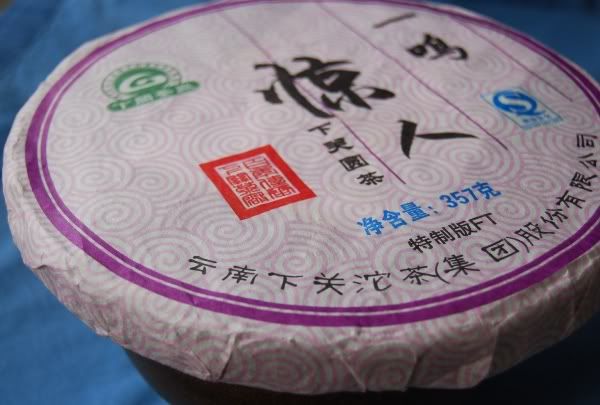
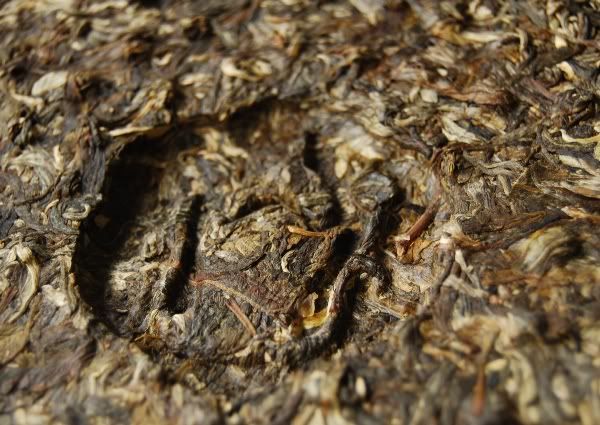
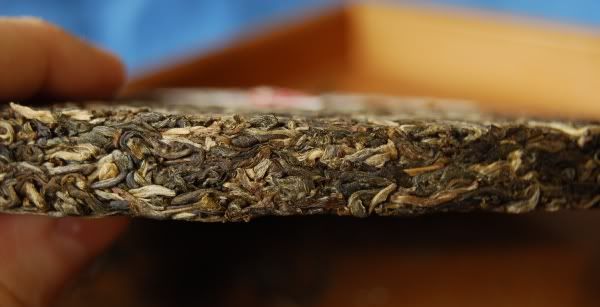
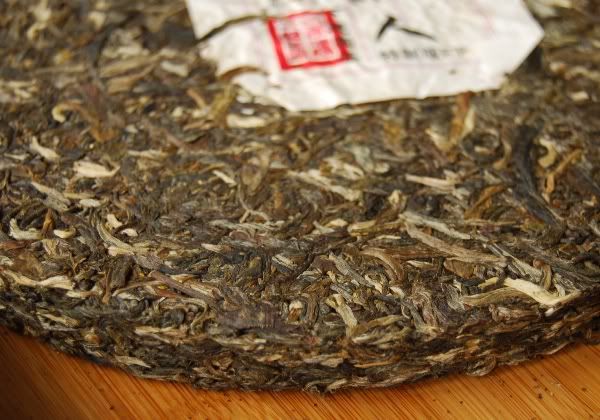
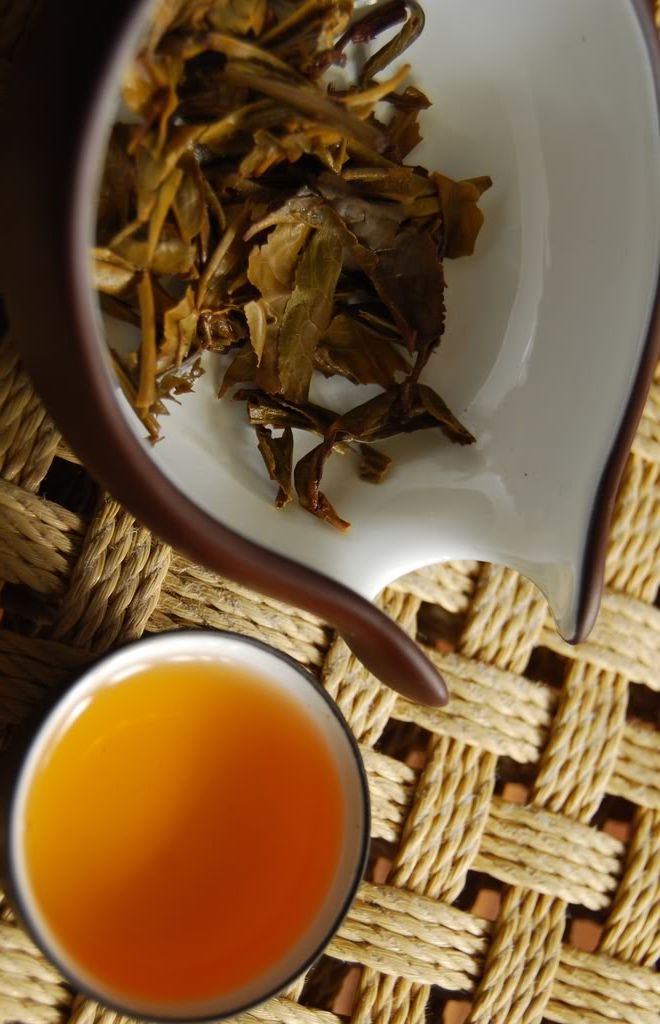
8 comments:
Why is it that Xiaguan compress their bings to such a degree? Perhaps if the bing is to drink now and not for aging I can understand locking the leaves away so tightly but cleanly separating the leaf without breaking them is such a faff!
Dear Yunzi,
Bear in mind that heavy compression is performed because one school of thought would argue that its slowing effect on aging causes better results than the faster aging of looser compression (cf. Recent 12 Gentlemen cakes).
That said, you wouldn't buy dark "modern Xiaguan specials" for aging, I suspect, due to their abnormal processing, and so the tiebing compression may just be for aesthetic purposes.
Toodlepip,
Hobbes
Correct me if I'm wrong, but I thought that the reason why tight compression is still used is because it's better for aging in more humid environments in Eastern Asia, where the vast majority of pu-erh drinkers live and store their tea. I don't think Xiaguan ever thought of the possibility of having their products age somewhere outside of Asia.
I don't think Xiaguan ever thought of the possibility of having their products age somewhere outside of Asia.
Au contraire! Xiaguan have one of the longest-lived export lines, largely intended for France, it seems, and they're traditionally like unto a chunk of rock. Remember those green cylinders covered in dirty Gallic script? What did the French do to deserve such attention?!
Toodlepip,
Hobbes
I think Xiaguan might have been catering to the French inclination for tobacco.
(this is an observation based solely on my limited interactions with the French).
Puerh could be one redeeming preference of the French. It's interesting that the haute cuisine people love their Puerh, as the French do.
A rose by any other nose would smell less sweet.
As for the "French connection", I am always amazed by this incongruity of French taste-
Haute cuisine
Vosne-Romanée
Jerry Lewis
Tony - Since you know of Vosne-Romanée, then you should also know there is little truth behind the Jerry Lewis stereotype (movie critic and government awards don't count) =P!
Post a Comment